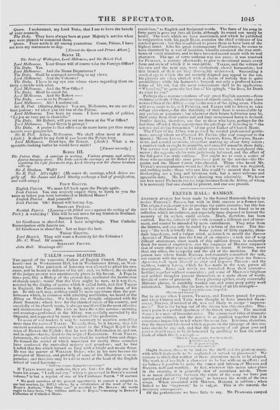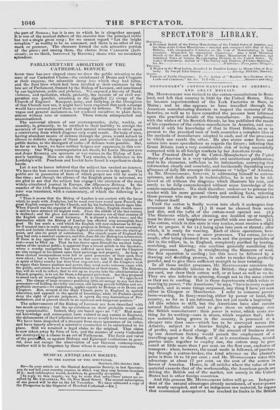EXETER HALL : SAMSON.
ANOTHER at•cmpt has been- made by the Sacred Harmonic Society to revive lIstesnais Samson, but with as little success as a former one. The original endeavour was to produce the entire oratorio ; but this has now been abandoned. To sit out the whole work was found to be an infliction which no audience, and especially none disposed to honour the memory of its author, could endure. Much, therefore, has been omitted. But the defects of this work demand a different sort of treat- ment, and cannot be amended by mere curtailment. They arise from the libretto, and can only be cured by a reform of the text. The his- tory the work is briefly this. Some person of little capacity, abun- dant impudence, and a vulgar mind, undertook to mould the Samson Agonistcs of MILTON DII0 the form of an oratorio; a task not of very difficult attainment, since much of this sublime drama is eminently fitted for musical expression, and the language of MILTON surpasses that of every other poet in its adaptability to music. It invites, more than any other, the sympathy and the aid of the musician. But the person into whose hands Ile:sore, unfortunately committed the task, not content with the occueetion of selecting passages from the Samson Agonistes, took upon himself to alter and improve 31H.ToN : and the ruthless, wanton havoe, which he has made in the text, passes all description. Lines and words are wrenched from their context— huddled together without connexion ; and some of Mwrox's brightest and noblest thoughts present themselves as a mere chaos of words, devoid of sense or grammar. Every glowing epithet, every essentially Miltonie phrase, is carefully weeded out, and some puny paltry word substituted. MILTON, like his hero, is robbed of all his strength- " timed out ritlic,:lous, tlesruird,
lAatlaut and disarm 'a."
But in an age when FALDEN, TIcKm.r., and FENTON passed for poets, and rlien CIBBER alld TATE were thought to have amended SHAK- SPERE, Mwros, if noticed at all, was not likely to escape " improve- ment." Nor is the laying out of the drama less objectionable. Ma- liox' m s poetic is a perfect specimen of the Greek tragedy. The musical Samsen is a mass of inconsistencies. The commonest rules of dramatic writing are violated, and the action is so jumbled together that it is sometimes impos:dble to tell whenu the scene lies. It is time, therefore, that the impudent falsehood which appears on the titlepage of this ora- torio should be expised, and that the memory of our great poet and patriot should cease to be diliottoured by ascribing to him the sort of trash of which this is it sample- • "llteit fr,a, (mu •arrow. fret' front thrall.
AtLlitlitt atal :ray
;mit play.
Ana colclaato this restil al." Ought Samson, them to be laid on the shelf, :led the glorious music with which it abotrads to be neglected or served up piecemeal ? We venture to think that neither of these alterations needs to be adopted. The work is of too high a character to be lost without an effort; anti we believe it possible to unite the 113■110$ arid lab011n of Murots and Illasoma well and worthily. In fact, wherever this union takes place in the oratorio, it is generally that of' aceordant minds. There is as much difference betweeu the musk of the song we have just quoted and that of " Total eclipse,- as between the words of the two songs. IThen associated with MILTON, HANDEL is sublime ; when linked to his " improver," he is sulgar. This is the natural, the
necessary consequence.
Of the performance we have little to say. Mr. PEAR$ALL essayed the part of Samson; but it is one to which he is altogether unequal. It is one of the musical defects of the oratorio that the principal treble has not a single great song ; for we cannot regard "Let the bright seraphim" as worthy to be so esteemed, and there is no other of any mark or pretence. The choruses formed the sole attractive portion of the piece ; and among them, the chorus from CARISSIMI (judi- ciously, as we think, borrowed by Batumi.) shone with no secondary splendour.



























 Previous page
Previous page